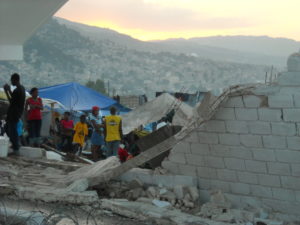This post written by American Red Cross volunteer in Haiti Winnie Romeril

After a tiring day of travel from Santo Domingo, I arrived at the American Red Cross office. The structure is visibly unstable but the open air office is abuzz with activity. All salvageable furniture is on the lawn, the front gates are open, and the street is orderly. It’s friendly, full of humanity. Red Cross flags hang on the walls.
In one area, two young girls wearing bright white Haitian Red Cross smocks are gently and persistently cleaning a wound beneath an old woman’s white hair. A gash on her arm is ugly and yellow, badly infected from an open fracture. They attend to her with warm smiles and easy banter, as if this situation is the most natural thing in the world. The Red Cross will take her by car to a hospital for further treatment.
Other volunteers are restocking large first aid kits with supplies that just arrived. The kits are for the first aid posts which the Red Cross has set up in the camps. Each is staffed with a doctor, a nurse and two first aiders.
On the other side of the yard, our American Red Cross head of office Matt Marek holds a team meeting. The sunset is spectacular, with the mountains in shadow and the sea glowing below. In the shadows, lie neighborhoods of rubble.
The Red Cross team reviews supplies, logistics and personnel for tomorrow. They call over four youth and announce they are now the new leadership who will head up teams tomorrow. Their groups of volunteers will comb the worst hit neighborhoods, street by street, preaching safe hygiene practices and encouraging people to come to the Red Cross first aid posts for triage, treatment and transfer if necessary.
The young leaders take over the meeting. Matt signals to me and we walk away, down the hill. About 20 feet away, the office compound wall no longer stands. We climb over the rubble into an area smaller than a baseball field where one hundred and forty-six families (over 700 people) now live. Tarps of every color are strung together over the entire space, save a small walkway around the perimeter. Red Cross flags hang high on the remaining wall to show people where to come for help.
We walk past a laughing group of children bathing with water from buckets. Matt takes me to the edge of the hill to where the land drops off precipitously. In all directions, a cascade of rubble runs like a river of rocks through every neighborhood on the sides of these mountains. We turn back toward the camp, greeting everyone with bon soir, ca va?
Matt lifts the edge of the curtain of rope and tarps and strolls in. We bend low and make our way down one of the rows under the communal plastic “roof.” We smile and acknowledge each family. Matt pauses and chats in Creole with one woman who is watching over two teenage girls in wheelchairs. One is fully bandaged toes to hips while the other has dressings around her head.
We head to the end of the row and buy some coconut cookies from a woman operating a kiosk out of her tent. Matt bargains fiercely for the cookies, barely suppressing a smile. Then once they agree on a price he pretends not to pay her and everyone nearby laughs.
The signs of resilience are encouraging. Tomorrow relief distributions will begin in this camp. But it is only the beginning of a long recovery process that will certainly take years.
